Nurses' Role in Patient Advocacy and the Affordable Care Act
VerifiedAdded on 2022/11/19
|8
|2241
|310
Essay
AI Summary
This essay examines the Affordable Care Act (ACA) and the critical role of nurses in patient advocacy. It explores how nurses can contribute to safe practice by ensuring patients understand their rights and benefits under the ACA, promoting health literacy, and advocating for equitable access to care. The essay reflects on the future role of nurses in response to evolving policies, emphasizing the need for nurses to stay informed and proactive in shaping healthcare interventions. The essay discusses how nurses can advocate for patients, providing information, and ensuring that the rights and benefits of the ACA are properly implemented, and addresses the importance of nurses' intervention in advocating for patient rights. It also highlights the need for nurses to use technology and information systems and to advocate for better healthcare outcomes. The essay also explores the importance of evidence-based care and the nurses' role in providing it, and how nurses can influence healthcare policies. The essay concludes by stating that nurses must be well-equipped to cope with the changing policy in the near future and the importance of the nursing profession in the health care system.
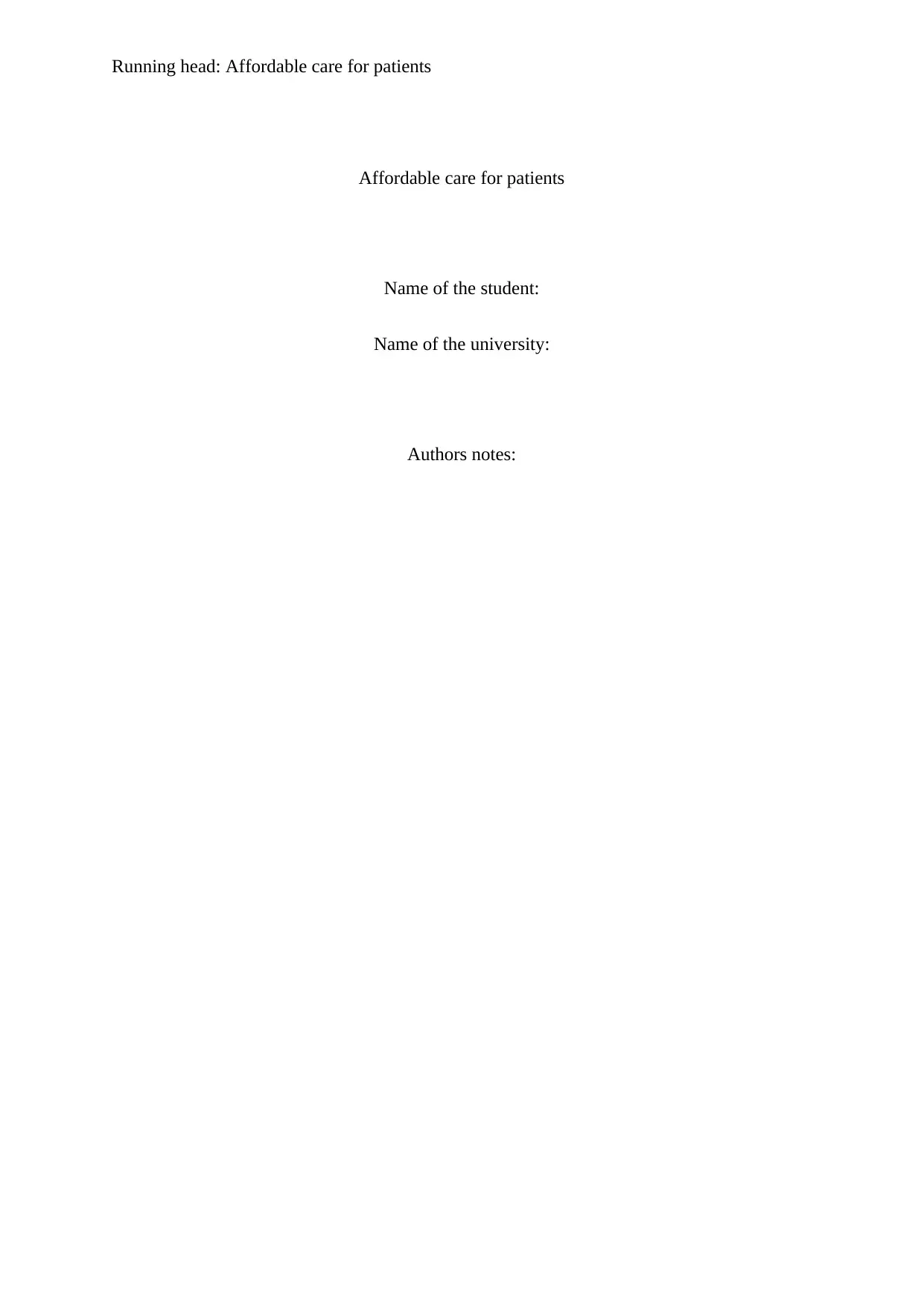
Running head: Affordable care for patients
Affordable care for patients
Name of the student:
Name of the university:
Authors notes:
Affordable care for patients
Name of the student:
Name of the university:
Authors notes:
Paraphrase This Document
Need a fresh take? Get an instant paraphrase of this document with our AI Paraphraser
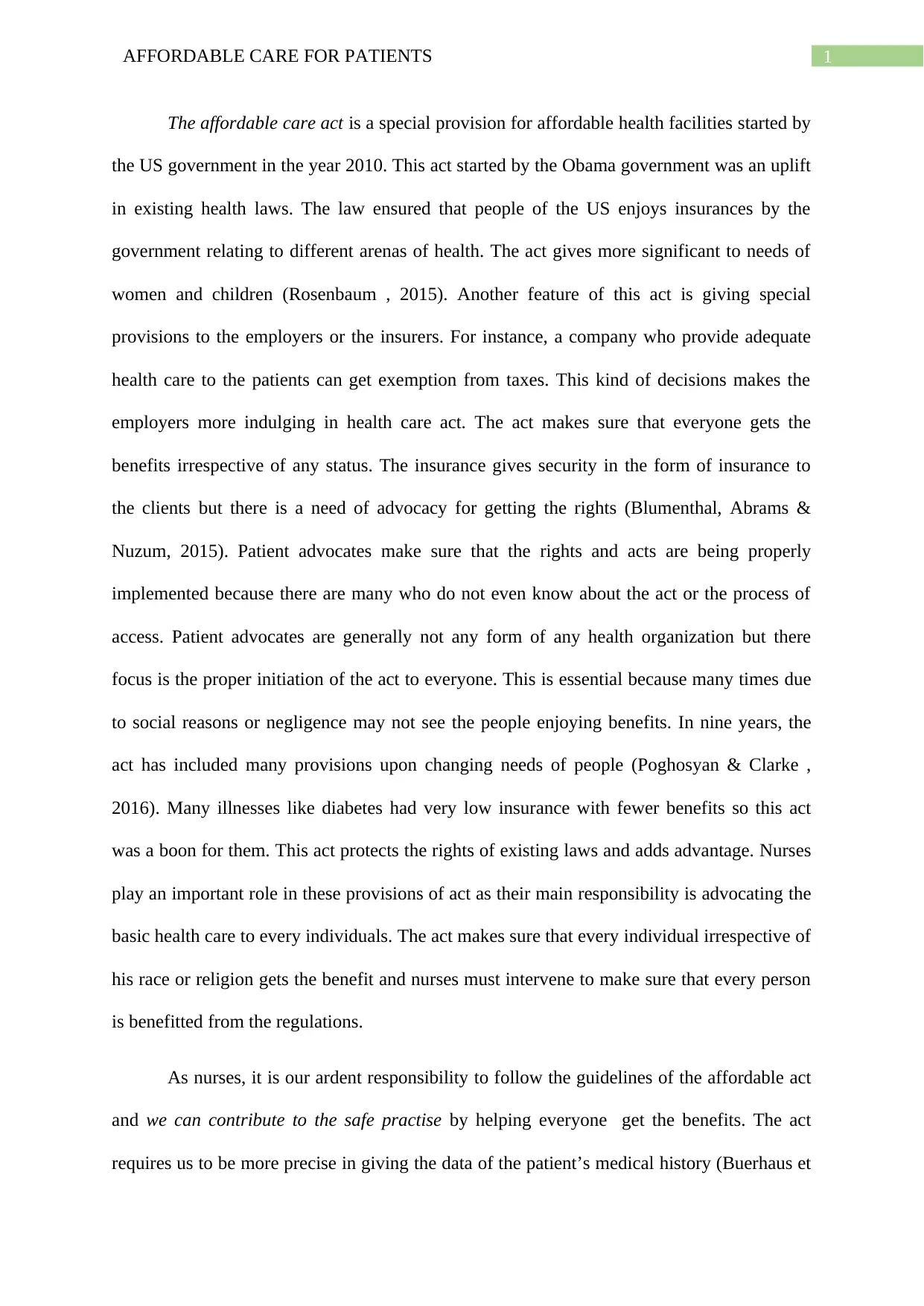
1AFFORDABLE CARE FOR PATIENTS
The affordable care act is a special provision for affordable health facilities started by
the US government in the year 2010. This act started by the Obama government was an uplift
in existing health laws. The law ensured that people of the US enjoys insurances by the
government relating to different arenas of health. The act gives more significant to needs of
women and children (Rosenbaum , 2015). Another feature of this act is giving special
provisions to the employers or the insurers. For instance, a company who provide adequate
health care to the patients can get exemption from taxes. This kind of decisions makes the
employers more indulging in health care act. The act makes sure that everyone gets the
benefits irrespective of any status. The insurance gives security in the form of insurance to
the clients but there is a need of advocacy for getting the rights (Blumenthal, Abrams &
Nuzum, 2015). Patient advocates make sure that the rights and acts are being properly
implemented because there are many who do not even know about the act or the process of
access. Patient advocates are generally not any form of any health organization but there
focus is the proper initiation of the act to everyone. This is essential because many times due
to social reasons or negligence may not see the people enjoying benefits. In nine years, the
act has included many provisions upon changing needs of people (Poghosyan & Clarke ,
2016). Many illnesses like diabetes had very low insurance with fewer benefits so this act
was a boon for them. This act protects the rights of existing laws and adds advantage. Nurses
play an important role in these provisions of act as their main responsibility is advocating the
basic health care to every individuals. The act makes sure that every individual irrespective of
his race or religion gets the benefit and nurses must intervene to make sure that every person
is benefitted from the regulations.
As nurses, it is our ardent responsibility to follow the guidelines of the affordable act
and we can contribute to the safe practise by helping everyone get the benefits. The act
requires us to be more precise in giving the data of the patient’s medical history (Buerhaus et
The affordable care act is a special provision for affordable health facilities started by
the US government in the year 2010. This act started by the Obama government was an uplift
in existing health laws. The law ensured that people of the US enjoys insurances by the
government relating to different arenas of health. The act gives more significant to needs of
women and children (Rosenbaum , 2015). Another feature of this act is giving special
provisions to the employers or the insurers. For instance, a company who provide adequate
health care to the patients can get exemption from taxes. This kind of decisions makes the
employers more indulging in health care act. The act makes sure that everyone gets the
benefits irrespective of any status. The insurance gives security in the form of insurance to
the clients but there is a need of advocacy for getting the rights (Blumenthal, Abrams &
Nuzum, 2015). Patient advocates make sure that the rights and acts are being properly
implemented because there are many who do not even know about the act or the process of
access. Patient advocates are generally not any form of any health organization but there
focus is the proper initiation of the act to everyone. This is essential because many times due
to social reasons or negligence may not see the people enjoying benefits. In nine years, the
act has included many provisions upon changing needs of people (Poghosyan & Clarke ,
2016). Many illnesses like diabetes had very low insurance with fewer benefits so this act
was a boon for them. This act protects the rights of existing laws and adds advantage. Nurses
play an important role in these provisions of act as their main responsibility is advocating the
basic health care to every individuals. The act makes sure that every individual irrespective of
his race or religion gets the benefit and nurses must intervene to make sure that every person
is benefitted from the regulations.
As nurses, it is our ardent responsibility to follow the guidelines of the affordable act
and we can contribute to the safe practise by helping everyone get the benefits. The act
requires us to be more precise in giving the data of the patient’s medical history (Buerhaus et
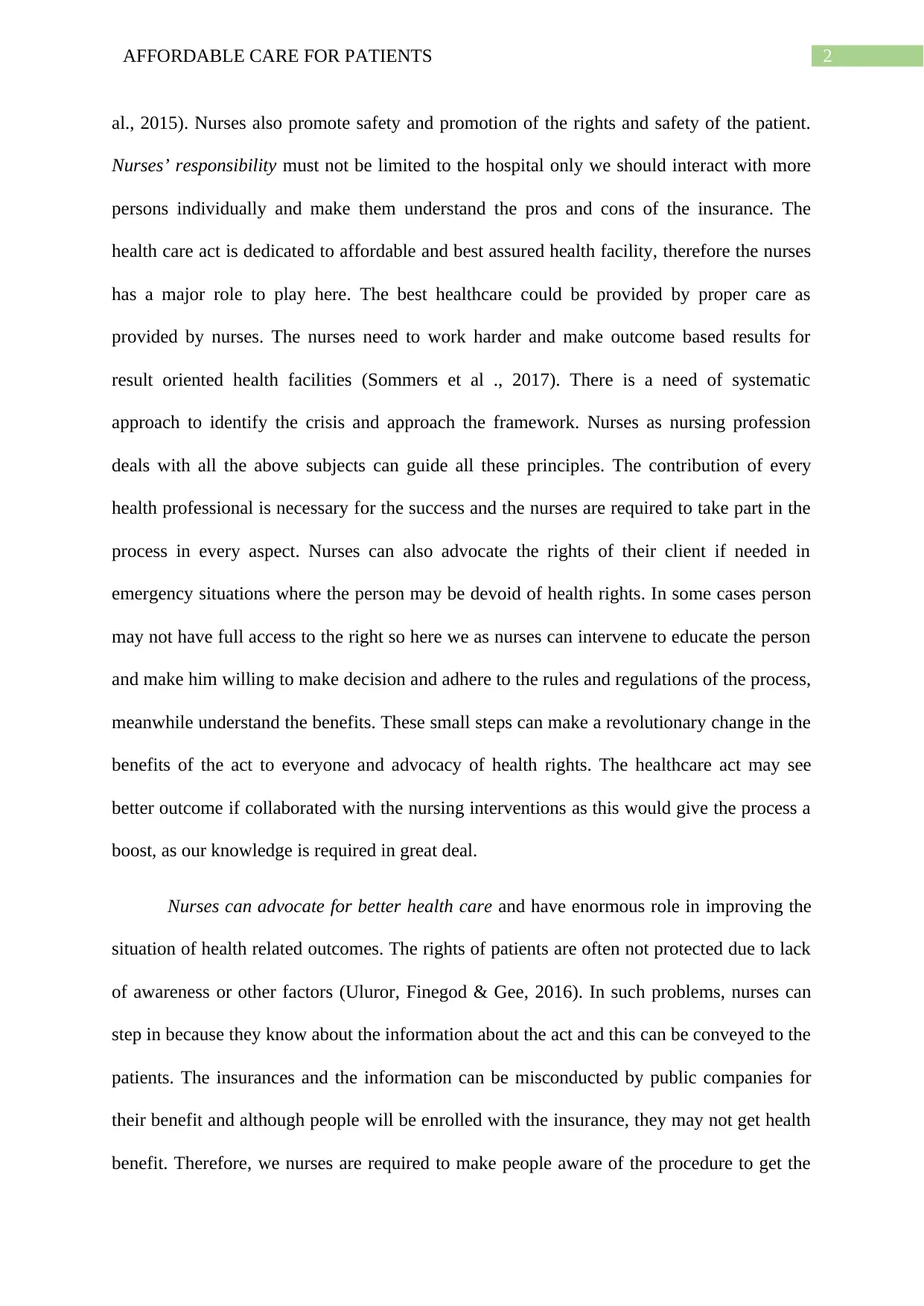
2AFFORDABLE CARE FOR PATIENTS
al., 2015). Nurses also promote safety and promotion of the rights and safety of the patient.
Nurses’ responsibility must not be limited to the hospital only we should interact with more
persons individually and make them understand the pros and cons of the insurance. The
health care act is dedicated to affordable and best assured health facility, therefore the nurses
has a major role to play here. The best healthcare could be provided by proper care as
provided by nurses. The nurses need to work harder and make outcome based results for
result oriented health facilities (Sommers et al ., 2017). There is a need of systematic
approach to identify the crisis and approach the framework. Nurses as nursing profession
deals with all the above subjects can guide all these principles. The contribution of every
health professional is necessary for the success and the nurses are required to take part in the
process in every aspect. Nurses can also advocate the rights of their client if needed in
emergency situations where the person may be devoid of health rights. In some cases person
may not have full access to the right so here we as nurses can intervene to educate the person
and make him willing to make decision and adhere to the rules and regulations of the process,
meanwhile understand the benefits. These small steps can make a revolutionary change in the
benefits of the act to everyone and advocacy of health rights. The healthcare act may see
better outcome if collaborated with the nursing interventions as this would give the process a
boost, as our knowledge is required in great deal.
Nurses can advocate for better health care and have enormous role in improving the
situation of health related outcomes. The rights of patients are often not protected due to lack
of awareness or other factors (Uluror, Finegod & Gee, 2016). In such problems, nurses can
step in because they know about the information about the act and this can be conveyed to the
patients. The insurances and the information can be misconducted by public companies for
their benefit and although people will be enrolled with the insurance, they may not get health
benefit. Therefore, we nurses are required to make people aware of the procedure to get the
al., 2015). Nurses also promote safety and promotion of the rights and safety of the patient.
Nurses’ responsibility must not be limited to the hospital only we should interact with more
persons individually and make them understand the pros and cons of the insurance. The
health care act is dedicated to affordable and best assured health facility, therefore the nurses
has a major role to play here. The best healthcare could be provided by proper care as
provided by nurses. The nurses need to work harder and make outcome based results for
result oriented health facilities (Sommers et al ., 2017). There is a need of systematic
approach to identify the crisis and approach the framework. Nurses as nursing profession
deals with all the above subjects can guide all these principles. The contribution of every
health professional is necessary for the success and the nurses are required to take part in the
process in every aspect. Nurses can also advocate the rights of their client if needed in
emergency situations where the person may be devoid of health rights. In some cases person
may not have full access to the right so here we as nurses can intervene to educate the person
and make him willing to make decision and adhere to the rules and regulations of the process,
meanwhile understand the benefits. These small steps can make a revolutionary change in the
benefits of the act to everyone and advocacy of health rights. The healthcare act may see
better outcome if collaborated with the nursing interventions as this would give the process a
boost, as our knowledge is required in great deal.
Nurses can advocate for better health care and have enormous role in improving the
situation of health related outcomes. The rights of patients are often not protected due to lack
of awareness or other factors (Uluror, Finegod & Gee, 2016). In such problems, nurses can
step in because they know about the information about the act and this can be conveyed to the
patients. The insurances and the information can be misconducted by public companies for
their benefit and although people will be enrolled with the insurance, they may not get health
benefit. Therefore, we nurses are required to make people aware of the procedure to get the
⊘ This is a preview!⊘
Do you want full access?
Subscribe today to unlock all pages.

Trusted by 1+ million students worldwide
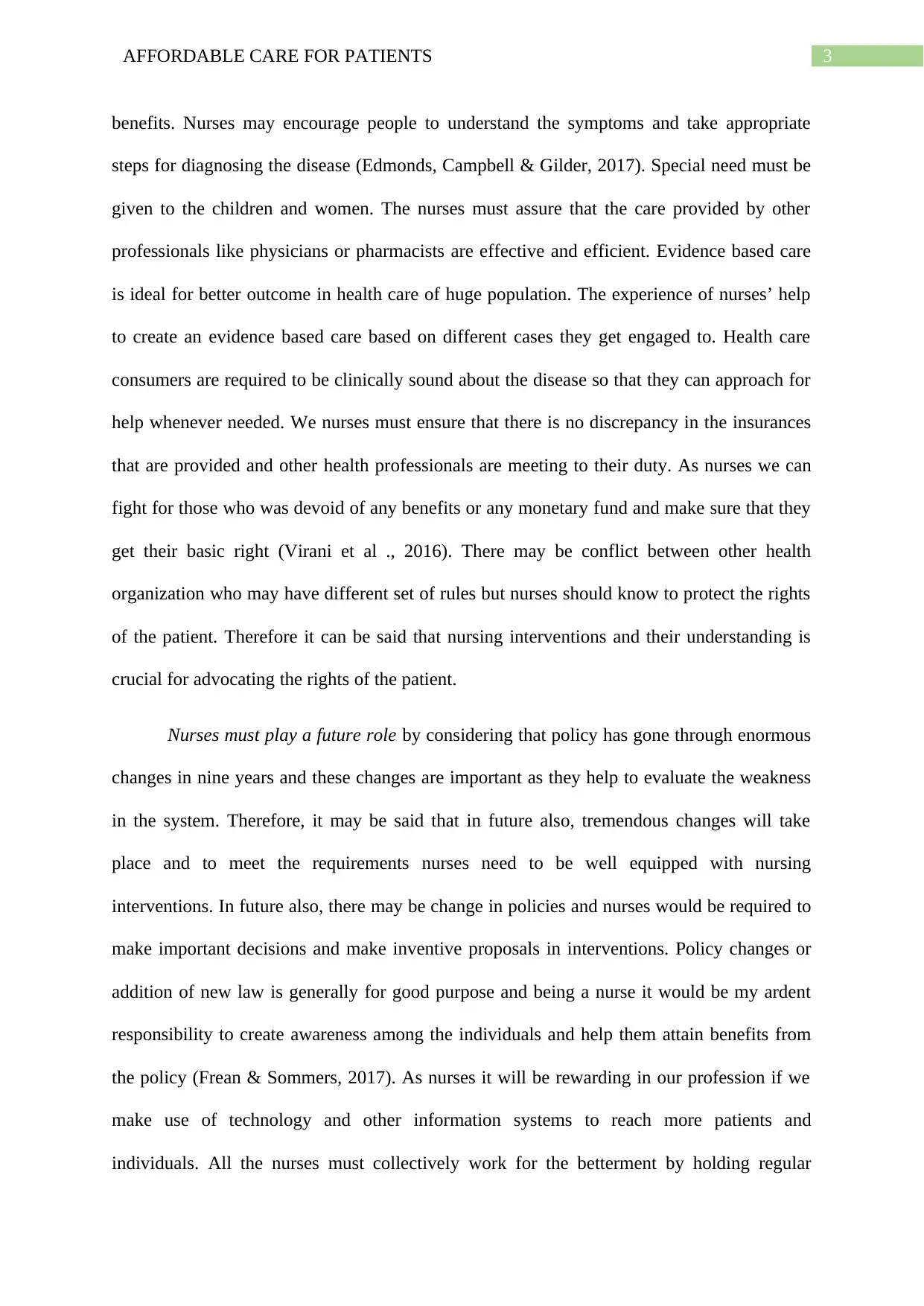
3AFFORDABLE CARE FOR PATIENTS
benefits. Nurses may encourage people to understand the symptoms and take appropriate
steps for diagnosing the disease (Edmonds, Campbell & Gilder, 2017). Special need must be
given to the children and women. The nurses must assure that the care provided by other
professionals like physicians or pharmacists are effective and efficient. Evidence based care
is ideal for better outcome in health care of huge population. The experience of nurses’ help
to create an evidence based care based on different cases they get engaged to. Health care
consumers are required to be clinically sound about the disease so that they can approach for
help whenever needed. We nurses must ensure that there is no discrepancy in the insurances
that are provided and other health professionals are meeting to their duty. As nurses we can
fight for those who was devoid of any benefits or any monetary fund and make sure that they
get their basic right (Virani et al ., 2016). There may be conflict between other health
organization who may have different set of rules but nurses should know to protect the rights
of the patient. Therefore it can be said that nursing interventions and their understanding is
crucial for advocating the rights of the patient.
Nurses must play a future role by considering that policy has gone through enormous
changes in nine years and these changes are important as they help to evaluate the weakness
in the system. Therefore, it may be said that in future also, tremendous changes will take
place and to meet the requirements nurses need to be well equipped with nursing
interventions. In future also, there may be change in policies and nurses would be required to
make important decisions and make inventive proposals in interventions. Policy changes or
addition of new law is generally for good purpose and being a nurse it would be my ardent
responsibility to create awareness among the individuals and help them attain benefits from
the policy (Frean & Sommers, 2017). As nurses it will be rewarding in our profession if we
make use of technology and other information systems to reach more patients and
individuals. All the nurses must collectively work for the betterment by holding regular
benefits. Nurses may encourage people to understand the symptoms and take appropriate
steps for diagnosing the disease (Edmonds, Campbell & Gilder, 2017). Special need must be
given to the children and women. The nurses must assure that the care provided by other
professionals like physicians or pharmacists are effective and efficient. Evidence based care
is ideal for better outcome in health care of huge population. The experience of nurses’ help
to create an evidence based care based on different cases they get engaged to. Health care
consumers are required to be clinically sound about the disease so that they can approach for
help whenever needed. We nurses must ensure that there is no discrepancy in the insurances
that are provided and other health professionals are meeting to their duty. As nurses we can
fight for those who was devoid of any benefits or any monetary fund and make sure that they
get their basic right (Virani et al ., 2016). There may be conflict between other health
organization who may have different set of rules but nurses should know to protect the rights
of the patient. Therefore it can be said that nursing interventions and their understanding is
crucial for advocating the rights of the patient.
Nurses must play a future role by considering that policy has gone through enormous
changes in nine years and these changes are important as they help to evaluate the weakness
in the system. Therefore, it may be said that in future also, tremendous changes will take
place and to meet the requirements nurses need to be well equipped with nursing
interventions. In future also, there may be change in policies and nurses would be required to
make important decisions and make inventive proposals in interventions. Policy changes or
addition of new law is generally for good purpose and being a nurse it would be my ardent
responsibility to create awareness among the individuals and help them attain benefits from
the policy (Frean & Sommers, 2017). As nurses it will be rewarding in our profession if we
make use of technology and other information systems to reach more patients and
individuals. All the nurses must collectively work for the betterment by holding regular
Paraphrase This Document
Need a fresh take? Get an instant paraphrase of this document with our AI Paraphraser
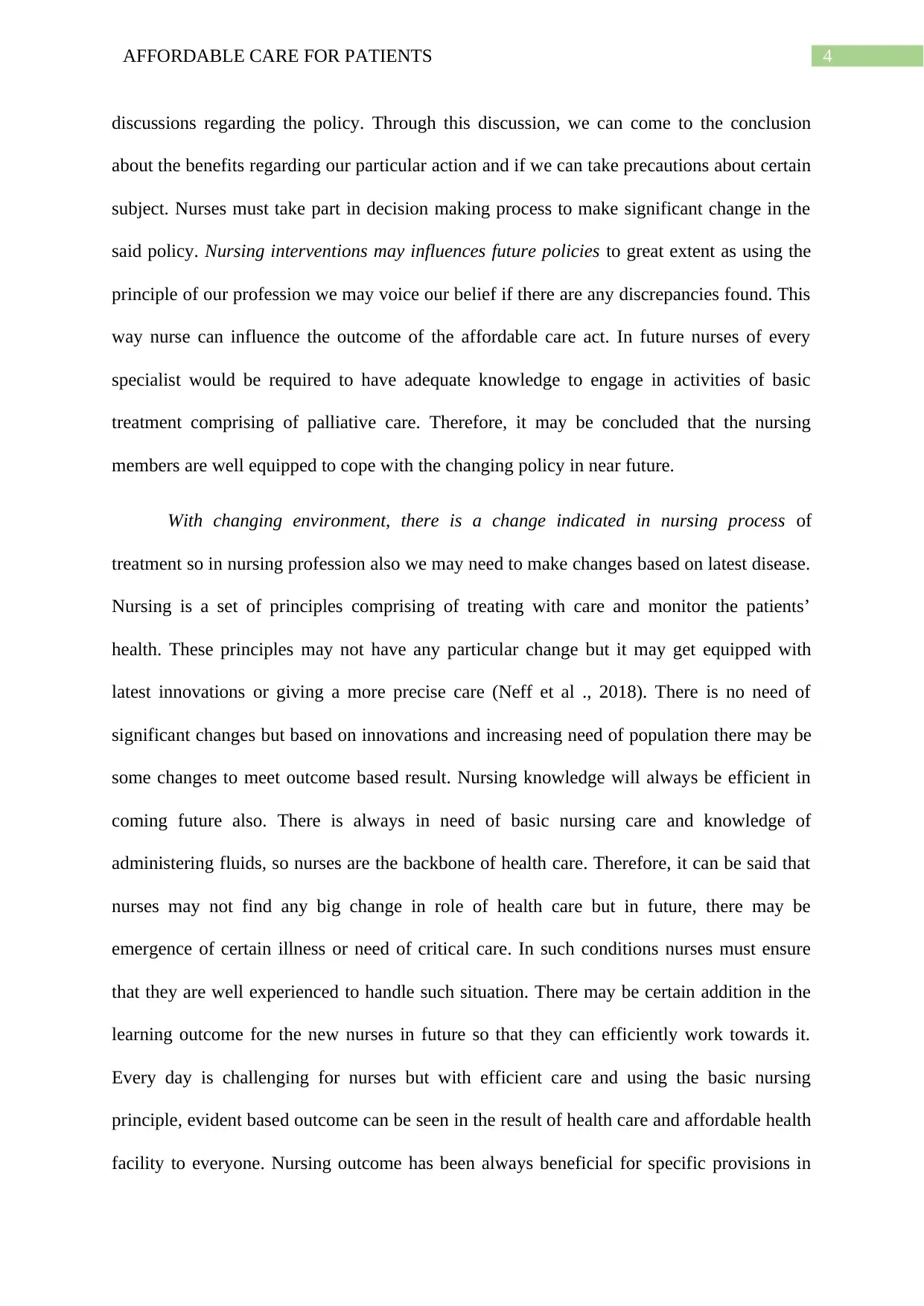
4AFFORDABLE CARE FOR PATIENTS
discussions regarding the policy. Through this discussion, we can come to the conclusion
about the benefits regarding our particular action and if we can take precautions about certain
subject. Nurses must take part in decision making process to make significant change in the
said policy. Nursing interventions may influences future policies to great extent as using the
principle of our profession we may voice our belief if there are any discrepancies found. This
way nurse can influence the outcome of the affordable care act. In future nurses of every
specialist would be required to have adequate knowledge to engage in activities of basic
treatment comprising of palliative care. Therefore, it may be concluded that the nursing
members are well equipped to cope with the changing policy in near future.
With changing environment, there is a change indicated in nursing process of
treatment so in nursing profession also we may need to make changes based on latest disease.
Nursing is a set of principles comprising of treating with care and monitor the patients’
health. These principles may not have any particular change but it may get equipped with
latest innovations or giving a more precise care (Neff et al ., 2018). There is no need of
significant changes but based on innovations and increasing need of population there may be
some changes to meet outcome based result. Nursing knowledge will always be efficient in
coming future also. There is always in need of basic nursing care and knowledge of
administering fluids, so nurses are the backbone of health care. Therefore, it can be said that
nurses may not find any big change in role of health care but in future, there may be
emergence of certain illness or need of critical care. In such conditions nurses must ensure
that they are well experienced to handle such situation. There may be certain addition in the
learning outcome for the new nurses in future so that they can efficiently work towards it.
Every day is challenging for nurses but with efficient care and using the basic nursing
principle, evident based outcome can be seen in the result of health care and affordable health
facility to everyone. Nursing outcome has been always beneficial for specific provisions in
discussions regarding the policy. Through this discussion, we can come to the conclusion
about the benefits regarding our particular action and if we can take precautions about certain
subject. Nurses must take part in decision making process to make significant change in the
said policy. Nursing interventions may influences future policies to great extent as using the
principle of our profession we may voice our belief if there are any discrepancies found. This
way nurse can influence the outcome of the affordable care act. In future nurses of every
specialist would be required to have adequate knowledge to engage in activities of basic
treatment comprising of palliative care. Therefore, it may be concluded that the nursing
members are well equipped to cope with the changing policy in near future.
With changing environment, there is a change indicated in nursing process of
treatment so in nursing profession also we may need to make changes based on latest disease.
Nursing is a set of principles comprising of treating with care and monitor the patients’
health. These principles may not have any particular change but it may get equipped with
latest innovations or giving a more precise care (Neff et al ., 2018). There is no need of
significant changes but based on innovations and increasing need of population there may be
some changes to meet outcome based result. Nursing knowledge will always be efficient in
coming future also. There is always in need of basic nursing care and knowledge of
administering fluids, so nurses are the backbone of health care. Therefore, it can be said that
nurses may not find any big change in role of health care but in future, there may be
emergence of certain illness or need of critical care. In such conditions nurses must ensure
that they are well experienced to handle such situation. There may be certain addition in the
learning outcome for the new nurses in future so that they can efficiently work towards it.
Every day is challenging for nurses but with efficient care and using the basic nursing
principle, evident based outcome can be seen in the result of health care and affordable health
facility to everyone. Nursing outcome has been always beneficial for specific provisions in
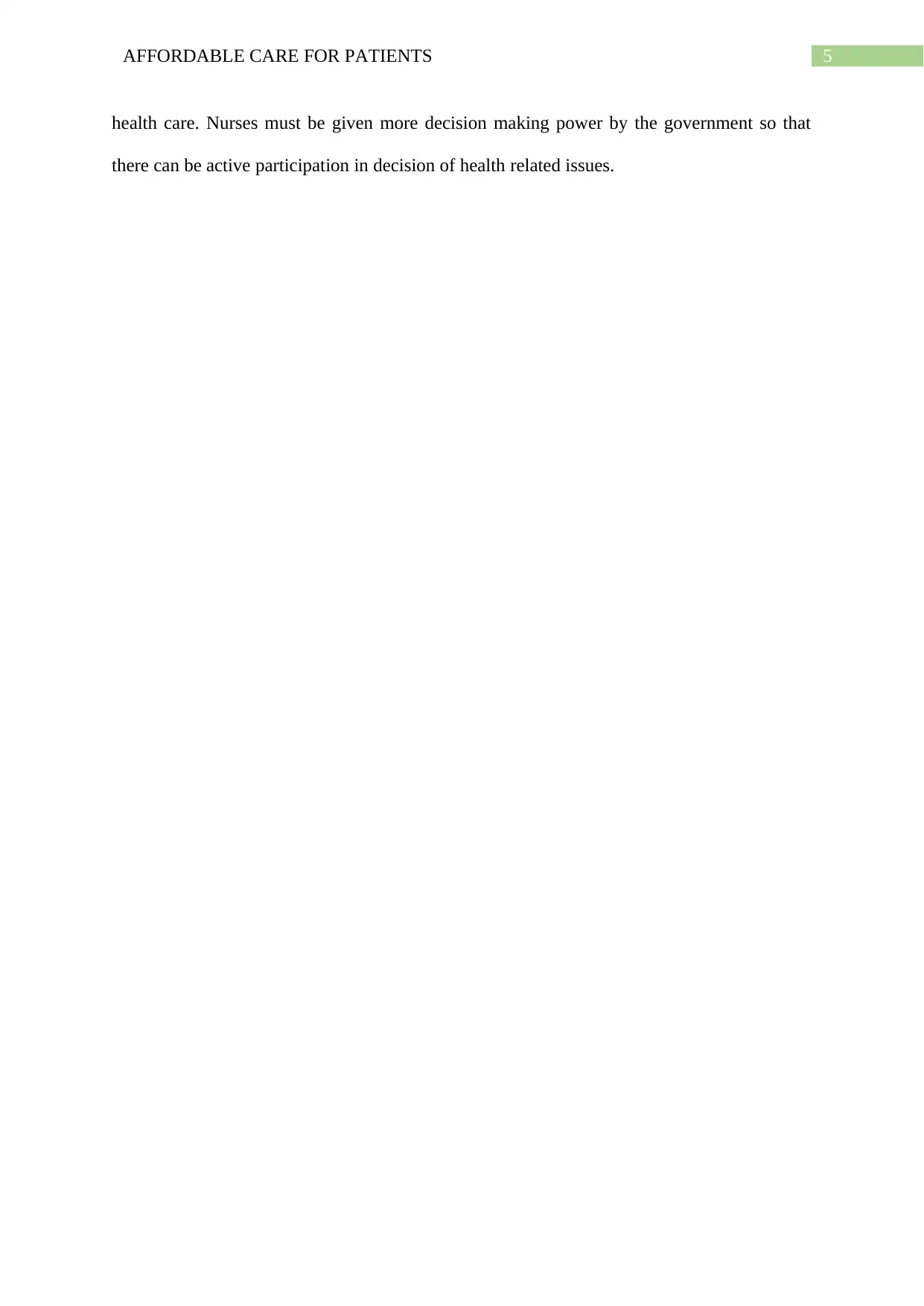
5AFFORDABLE CARE FOR PATIENTS
health care. Nurses must be given more decision making power by the government so that
there can be active participation in decision of health related issues.
health care. Nurses must be given more decision making power by the government so that
there can be active participation in decision of health related issues.
⊘ This is a preview!⊘
Do you want full access?
Subscribe today to unlock all pages.

Trusted by 1+ million students worldwide
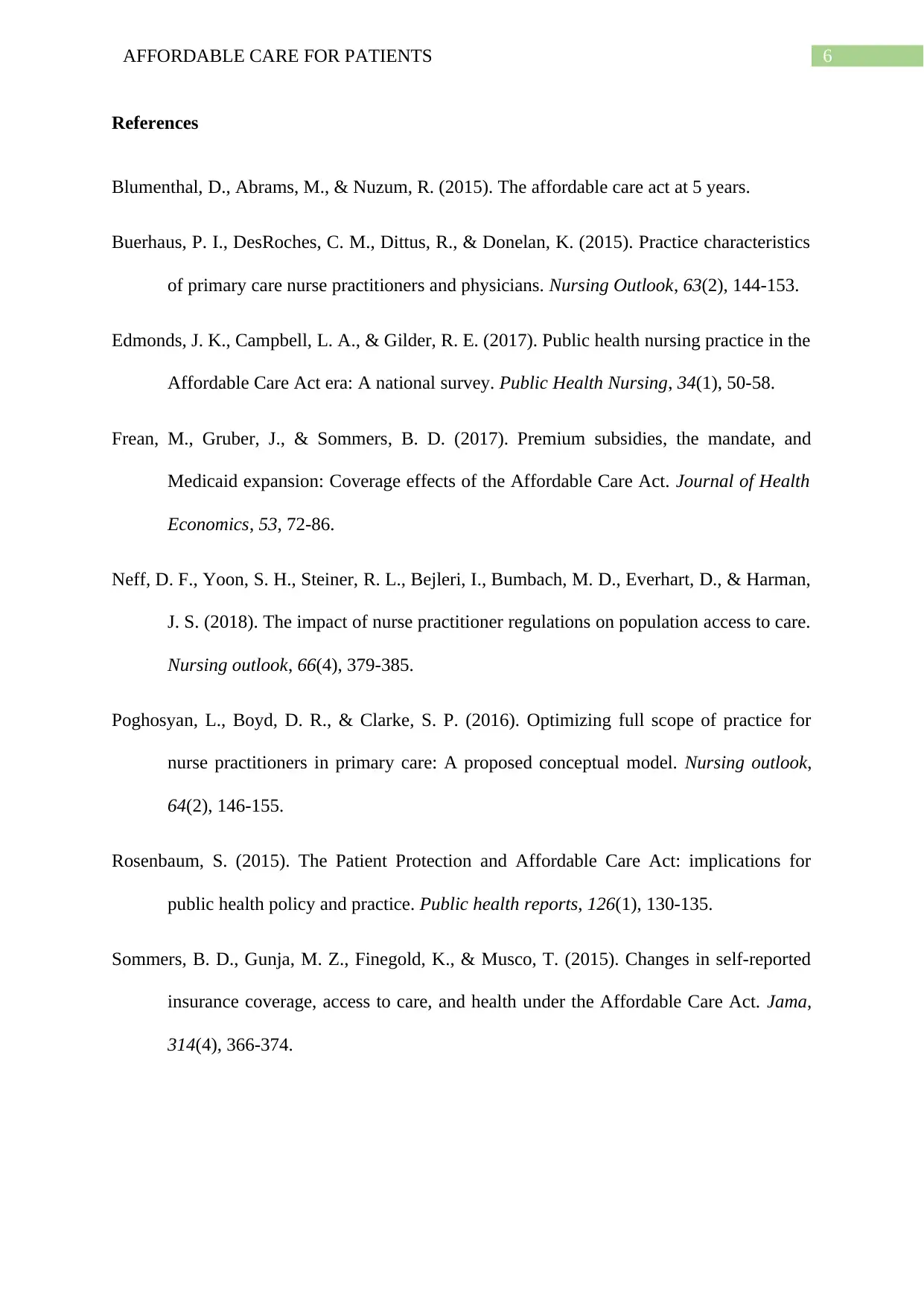
6AFFORDABLE CARE FOR PATIENTS
References
Blumenthal, D., Abrams, M., & Nuzum, R. (2015). The affordable care act at 5 years.
Buerhaus, P. I., DesRoches, C. M., Dittus, R., & Donelan, K. (2015). Practice characteristics
of primary care nurse practitioners and physicians. Nursing Outlook, 63(2), 144-153.
Edmonds, J. K., Campbell, L. A., & Gilder, R. E. (2017). Public health nursing practice in the
Affordable Care Act era: A national survey. Public Health Nursing, 34(1), 50-58.
Frean, M., Gruber, J., & Sommers, B. D. (2017). Premium subsidies, the mandate, and
Medicaid expansion: Coverage effects of the Affordable Care Act. Journal of Health
Economics, 53, 72-86.
Neff, D. F., Yoon, S. H., Steiner, R. L., Bejleri, I., Bumbach, M. D., Everhart, D., & Harman,
J. S. (2018). The impact of nurse practitioner regulations on population access to care.
Nursing outlook, 66(4), 379-385.
Poghosyan, L., Boyd, D. R., & Clarke, S. P. (2016). Optimizing full scope of practice for
nurse practitioners in primary care: A proposed conceptual model. Nursing outlook,
64(2), 146-155.
Rosenbaum, S. (2015). The Patient Protection and Affordable Care Act: implications for
public health policy and practice. Public health reports, 126(1), 130-135.
Sommers, B. D., Gunja, M. Z., Finegold, K., & Musco, T. (2015). Changes in self-reported
insurance coverage, access to care, and health under the Affordable Care Act. Jama,
314(4), 366-374.
References
Blumenthal, D., Abrams, M., & Nuzum, R. (2015). The affordable care act at 5 years.
Buerhaus, P. I., DesRoches, C. M., Dittus, R., & Donelan, K. (2015). Practice characteristics
of primary care nurse practitioners and physicians. Nursing Outlook, 63(2), 144-153.
Edmonds, J. K., Campbell, L. A., & Gilder, R. E. (2017). Public health nursing practice in the
Affordable Care Act era: A national survey. Public Health Nursing, 34(1), 50-58.
Frean, M., Gruber, J., & Sommers, B. D. (2017). Premium subsidies, the mandate, and
Medicaid expansion: Coverage effects of the Affordable Care Act. Journal of Health
Economics, 53, 72-86.
Neff, D. F., Yoon, S. H., Steiner, R. L., Bejleri, I., Bumbach, M. D., Everhart, D., & Harman,
J. S. (2018). The impact of nurse practitioner regulations on population access to care.
Nursing outlook, 66(4), 379-385.
Poghosyan, L., Boyd, D. R., & Clarke, S. P. (2016). Optimizing full scope of practice for
nurse practitioners in primary care: A proposed conceptual model. Nursing outlook,
64(2), 146-155.
Rosenbaum, S. (2015). The Patient Protection and Affordable Care Act: implications for
public health policy and practice. Public health reports, 126(1), 130-135.
Sommers, B. D., Gunja, M. Z., Finegold, K., & Musco, T. (2015). Changes in self-reported
insurance coverage, access to care, and health under the Affordable Care Act. Jama,
314(4), 366-374.
Paraphrase This Document
Need a fresh take? Get an instant paraphrase of this document with our AI Paraphraser
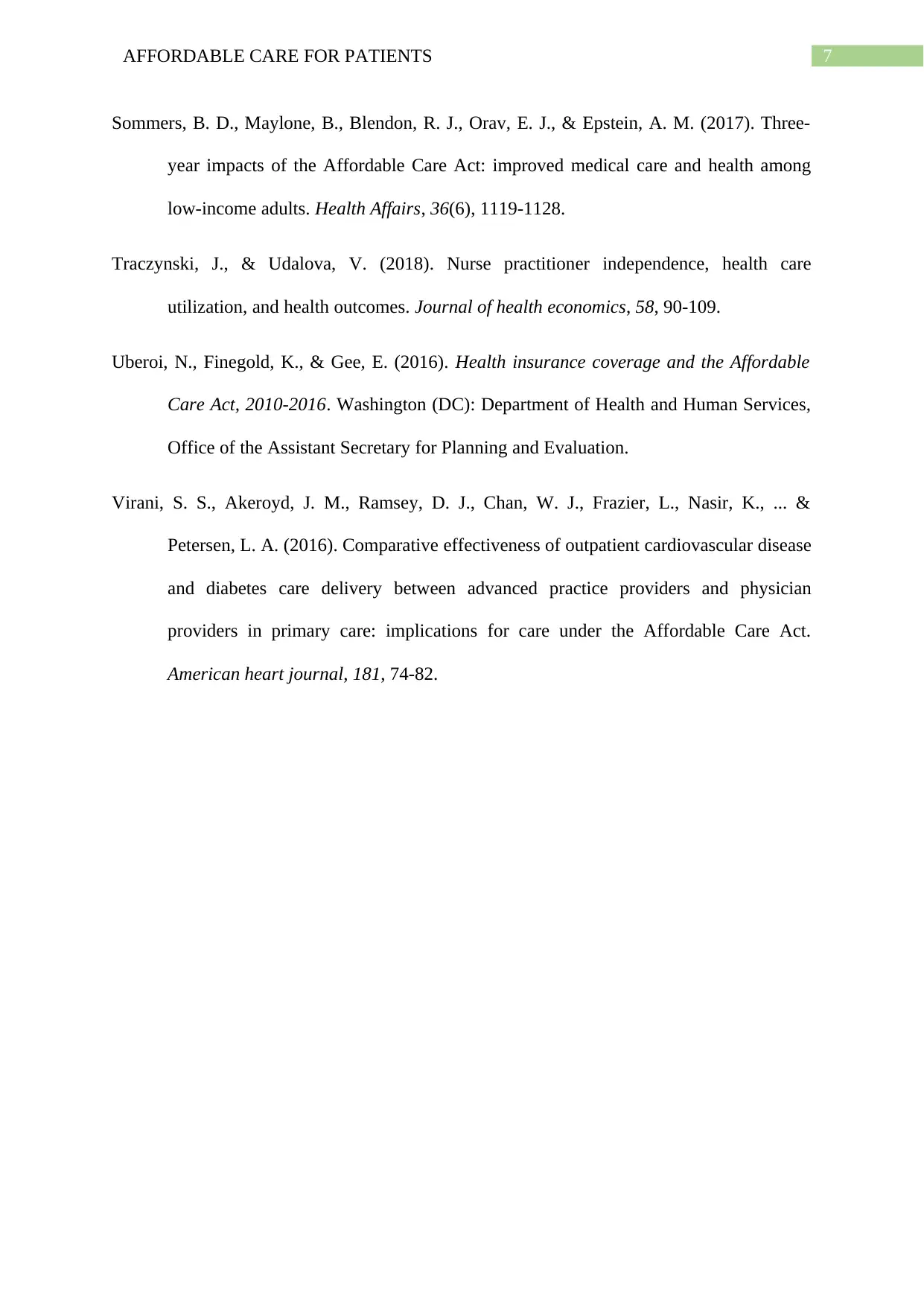
7AFFORDABLE CARE FOR PATIENTS
Sommers, B. D., Maylone, B., Blendon, R. J., Orav, E. J., & Epstein, A. M. (2017). Three-
year impacts of the Affordable Care Act: improved medical care and health among
low-income adults. Health Affairs, 36(6), 1119-1128.
Traczynski, J., & Udalova, V. (2018). Nurse practitioner independence, health care
utilization, and health outcomes. Journal of health economics, 58, 90-109.
Uberoi, N., Finegold, K., & Gee, E. (2016). Health insurance coverage and the Affordable
Care Act, 2010-2016. Washington (DC): Department of Health and Human Services,
Office of the Assistant Secretary for Planning and Evaluation.
Virani, S. S., Akeroyd, J. M., Ramsey, D. J., Chan, W. J., Frazier, L., Nasir, K., ... &
Petersen, L. A. (2016). Comparative effectiveness of outpatient cardiovascular disease
and diabetes care delivery between advanced practice providers and physician
providers in primary care: implications for care under the Affordable Care Act.
American heart journal, 181, 74-82.
Sommers, B. D., Maylone, B., Blendon, R. J., Orav, E. J., & Epstein, A. M. (2017). Three-
year impacts of the Affordable Care Act: improved medical care and health among
low-income adults. Health Affairs, 36(6), 1119-1128.
Traczynski, J., & Udalova, V. (2018). Nurse practitioner independence, health care
utilization, and health outcomes. Journal of health economics, 58, 90-109.
Uberoi, N., Finegold, K., & Gee, E. (2016). Health insurance coverage and the Affordable
Care Act, 2010-2016. Washington (DC): Department of Health and Human Services,
Office of the Assistant Secretary for Planning and Evaluation.
Virani, S. S., Akeroyd, J. M., Ramsey, D. J., Chan, W. J., Frazier, L., Nasir, K., ... &
Petersen, L. A. (2016). Comparative effectiveness of outpatient cardiovascular disease
and diabetes care delivery between advanced practice providers and physician
providers in primary care: implications for care under the Affordable Care Act.
American heart journal, 181, 74-82.
1 out of 8
Related Documents
Your All-in-One AI-Powered Toolkit for Academic Success.
+13062052269
info@desklib.com
Available 24*7 on WhatsApp / Email
![[object Object]](/_next/static/media/star-bottom.7253800d.svg)
Unlock your academic potential
Copyright © 2020–2026 A2Z Services. All Rights Reserved. Developed and managed by ZUCOL.





